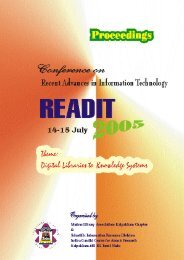READIT-2007 - Indira Gandhi Centre for Atomic Research
READIT-2007 - Indira Gandhi Centre for Atomic Research
READIT-2007 - Indira Gandhi Centre for Atomic Research
Create successful ePaper yourself
Turn your PDF publications into a flip-book with our unique Google optimized e-Paper software.
7. KNOWLEDGE MANAGEMENT SOLUTION IN DIGITAL<br />
INFORMATION SYSTEM<br />
• People Aspects: Training development, recruitment motivation, retention,<br />
organization, job design, cultural change and encouraging thinking and<br />
participation<br />
• Process Aspects: Process innovation, re-engineering both <strong>for</strong> radical and<br />
continuous improvement<br />
• Technology Aspects: In<strong>for</strong>mation and decision support systems, knowledgebased<br />
systems and data mining systems.<br />
• Knowledge Management In An Academic Setting: It must encompass the<br />
community of scholars in a given discipline and must be able to integrate<br />
publications, data sets, tools <strong>for</strong> manipulating such data, connections to<br />
databases of pictures and images and much more [3]<br />
• Systematic Approaches To Knowledge Management: It retains the<br />
traditional faith in rational analysis of the knowledge problem. The problem<br />
can be solved, but new thinking many kinds is required some basic<br />
assumptions:<br />
a) A resource cannot be managed unless it is modeled, and many aspects of<br />
the organization’s knowledge can be modeled as an explicit resource.<br />
b) Solutions can be found in a variety of disciplines and technologies and<br />
traditional methods of analysis can be used to re-examine the nature of<br />
knowledge work and to solve the knowledge problem [10]<br />
c) Cultural issues are important, but they too must be evaluated<br />
systematically. Employees may not have to be “Changed” but policies and<br />
work practices must certainly be changed and technology can be applied<br />
successfully to business knowledge problems themselves.<br />
d) Knowledge management has an important management component, but it<br />
is not an activity or discipline that belongs exclusively to managers. [16]<br />
8. CONCLUSION<br />
Knowledge has become important productive factor <strong>for</strong> the modern digital<br />
in<strong>for</strong>mation system. The society Will inevitably require intensified management of<br />
knowledge .How to manage knowledge will become an important subject facing<br />
libraries in near future. Knowledge Management in Libraries should be focused on<br />
effective research and development of knowledge, creation of knowledge bases,<br />
exchange and sharing of knowledge between library staffs including its users, training<br />
of library staff, speeding up explicit processing of the implicit knowledge and<br />
realizing of its sharing. Economic environment and in<strong>for</strong>mation environment is<br />
changing quickly today. Since Knowledge management has become a powerful tool<br />
<strong>for</strong> promoting innovation and realizing reengineering the various walks of life, it<br />
occupies very outstanding position in the creation of the knowledge innovation<br />
systems of a country. Hence it is very essential to focus on Knowledge Management<br />
systems in Libraries and in<strong>for</strong>mation centres by which the timely in<strong>for</strong>mation service<br />
can be provided to the online user society.<br />
28

















